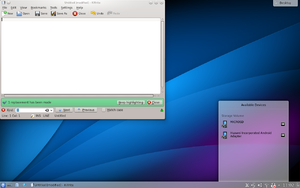KDE SC
 |
|

|
|
| Developer(s) | KDE |
|---|---|
| Initial release | 1.0 / 12 July 1998 |
| Stable release | 4.14.3 (November 11, 2014) |
| Development status | Discontinued |
| Written in | Mainly C++ (Qt), some C |
| Operating system | Entire DE: Unix-like with X11 or and also Windows XP–7. Applications only: Mac OS X 10.4–10.6 |
| Available in | 86 languages |
|
List of languages
|
|
| Type | Desktop environment |
| License | GNU GPL, GNU LGPL, BSD License, MIT License |
| Website | www |
The KDE Software Compilation (KDE SC) was formerly used as an umbrella term consisting of a desktop environment and an associated range of KDE Applications produced by KDE. Prior to version 4.4, released in February 2010, the Software Compilation was known as KDE, which stood for K Desktop Environment until November 2009. The KDE SC included only applications whose development teams chose to follow the Software Compilation's release schedule; as a result, many popular KDE applications, such as Amarok and Digikam, were not part of the Software Compilation. To date there have been four series of releases. After that, the KDE SC was split into three separate product entities: KDE Plasma, KDE Frameworks and KDE Applications, each with their own independent release schedules.
KDE was founded in 1996 by Matthias Ettrich, who was then a student at the Eberhard Karls University of Tübingen. At the time, he was troubled by certain aspects of the Unix desktop. Among his qualms was that none of the applications looked, felt, or worked alike. He proposed the formation of not only a set of applications, but, rather, a desktop environment, in which users could expect things to look, feel, and work consistently. He also wanted to make this desktop easy to use; one of his complaints with desktop applications of the time was that his girlfriend could not use them. His initial Usenet post spurred a lot of interest, and the KDE project was born.
Ettrich chose to use Trolltech’s Qt framework for the KDE project. Other programmers quickly started developing KDE/Qt applications, and by early 1997, a few applications were being released.
On 12 July 1998, K Desktop Environment 1.0 was released. In November 1998, the Qt toolkit was dual-licensed under the free/open source Q Public License (QPL) and a proprietary license for proprietary software developers. Debate continued about compatibility with the GNU General Public License (GPL), so in September 2000, Trolltech made the Unix version of the Qt libraries available under the GPL, in addition to the QPL. Trolltech continued to require licenses for developing proprietary software with Qt. The core libraries of KDE are collectively licensed under the GNU LGPL, but the only way for proprietary software to make use of them was to be developed under the terms of the Qt proprietary license.
...
Wikipedia
